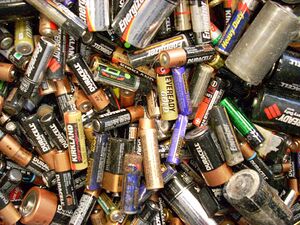Batteries

Overview
Manufacturers, importers, distributors and retailers have an Extended Producer Responsibility [1] for Batteries in order to control their levels of mercury, cadmium and lead, assist their recycling through clear labelling and ensure that on disposal they are properly treated and recycled, rather than being sent for incineration or to landfill, both of which are illegal [2]
The Regulations [3] cover all batteries, regardless of whether they are in products and divided into:
- A portable battery (sealed, weighs less than 4kg, not industrial or automotive, with a collection rate target of 45%)
- An industrial battery (designed exclusively for industrial or professional purposes, used as a source of power for propulsion in an electric or hybrid vehicle, unsealed but is not automotive, sealed but is not portable)
- An automotive battery (used as automotive starter, lighting or ignition power)
The sections that follow on battery types only breakdown two types of batteries - representing that reported by WasteDataFlow managed by local authorities.
Macro Tonnages
The most recent information published by DEFRA [4] [5] is summarized in the pie chart below, showing 128,303 tonnes of batteries and accumulators generated in the UK in 2016 and is part of the broader tonnage summarized in UK Waste Tonnage:
| Batteries and Accumulators | |
|---|---|
<graph>
{
"version": 2,
"width": 100,
"height": 100,
"data": [
{
"name": "table",
"values": [
{"name":"AFF","value":4906},
{"name":"MQ","value":533},
{"name":"Ind","value":3028},
{"name":"Con","value":0},
{"name":"Com","value":109442},
{"name":"HH","value":10395}
],
"transform": [{"type": "pie","field": "value"}]
}
],
"scales": [
{
"name": "r",
"type":"sqrt",
"domain": {"data": "table","field": "value"},
"range": [20,200]
},
{
"name":"color",
"type":"ordinal",
"domain":{"data":"table","field":"name"},
"range":"category10"
}
],
"marks": [
{
"type": "arc",
"from": {"data": "table"},
"properties": {
"enter": {
"x": {"field": {"group": "width"},"mult": 0.5},
"y": {"field": {"group": "height"},"mult": 0.5},
"startAngle": {"field": "layout_start"},
"endAngle": {"field": "layout_end"},
"innerRadius": {"value": 20},
"outerRadius": {"scale": "r","field": "value"},
"stroke": {"value": "#fff"},
"fill":{"scale":"color","field":"name"}
}
}
}
],
"legends":[{
"fill":"color",
"title":"",
"offset": 175,
"properties":{
"symbols":{
"strokeWidth":{"value":0},
"shape":{"value":"square"},
"size":{"value":175}
}
}
}]
}
</graph> | |
| Data Table | |
| Agriculture, Forestry and Fishing (AFF) | 4,906 |
| Mining and Quarrying (MQ) | 533 |
| Industrial (Ind) | 3,028 |
| Construction (Con) | 0 |
| Commercial (Com) | 109,442 |
| Household (HH) | 10,395 |
The macro picture does not breakdown into the respective types of batteries but the National Packaging Waste Database[6] reports the data for portable batteries and the performance against the UK collection rate target of 45%. In the most recently reported year 2021 for portable batteries the UK (which will be provisional until May 2022):
- 43,754 tonnes of portable batteries were placed on the market by 595 scheme members
- 18,292 tonnes of portable waste batteries were collected:
- 14,101 tonnes were lead/acid batteries (77%)
- 324 tonnes were nickel/cadmium batteries (2%)
- 3,867 tonnes were other types of batteries (21%)
- 18,466 tonnes were delivered for treatment and battery evidence were accepted for a similar tonnage
- 45.88% UK collection rate achieved (in some previous years this target has not been met, for example in 2017 a 44.89% figure was achieved[7].
The macro numbers are therefore distorted by the broader category that it represents, and the tonnage in the following sections managed by local authorities represent around 10,000 tonnes out of around 17,000 tonnes (notwithstanding the difference in dates of the data reported).
Automotive Batteries
Below is a list of local authorities that sends more than 7500 tonnes of this material to a single waste operator.
| Authority | Stream | Facility | Operator | Address | Material | Tonnes | Reporting Period |
|---|---|---|---|---|---|---|---|
| Merseyside WDA (MBC) | Source segregated recyclate | Reprocessor - recycling (qu19) | S Norton & Co Ltd | Bankfield House, Bankfield Mill, Regent Road, Liverpool, Merseyside | Automotive batteries | 17,486.76 | Apr21 - Mar22 |
| Devon County Council | Source segregated recyclate | Reprocessor - recycling (qu19) | Sims Group Uk Ltd | 7 Christow Road, Marsh Barton Ind Est, Exeter, Devon | Automotive batteries | 10,490.73 | Apr21 - Mar22 |
| Swindon Borough Council | Source segregated recyclate | Reprocessor - recycling (qu19) | Jeremy Mark Freeth | Kingshill Recycling Centre, Cricklade, Swindon, Wiltshire | Automotive batteries | 8,326.98 | Apr21 - Mar22 |
Post Consumer, Non-automotive Batteries
Below is a list of local authorities that sends more than 2000 tonnes of this material to a single waste operator.
| Authority | Stream | Facility | Operator | Address | Material | Tonnes | Reporting Period |
|---|---|---|---|---|---|---|---|
| Norfolk County Council | Source segregated recyclate | Reprocessor - recycling (qu19) | Wiser Recycling Ltd | St lves Resource Recovery Facility, Caxton Road, St lves, Cornwall | Post consumer, non automotive batteries | 4,205.06 | Apr21 - Mar22 |
| Kent County Council | Source segregated recyclate | Reprocessor - recycling (qu19) | Ling Metals Ltd | Parham Rd, Riverdale Industrial Esta, Canterbury, Kent | Post consumer, non automotive batteries | 3,285.40 | Apr21 - Mar22 |
| Lincolnshire County Council | Source segregated recyclate | Reprocessor - recycling (qu19) | Sims Group U K Ltd | South Dock, Westway Road, Newport Docks, Newport, Gwent | Post consumer, non automotive batteries | 2,323.41 | Apr21 - Mar22 |
References
- ↑ gov.uk website Waste batteries:producer responsibility
- ↑ gov.uk website: Regulations: batteries and waste batteries
- ↑ The underpinning legislation is: The Batteries and Accumulators (Placing on the Market) Regulations 2008 (as amended) and the Waste Batteries and Accumulators Regulations 2009 (as amended)
- ↑ Digest of Waste Resources 2020
- ↑ UK Statistics on Waste 2020
- ↑ https://npwd.environment-agency.gov.uk/Public/Batteries/PublishedReports.aspx
- ↑ Letsrecycle news item August 2018
